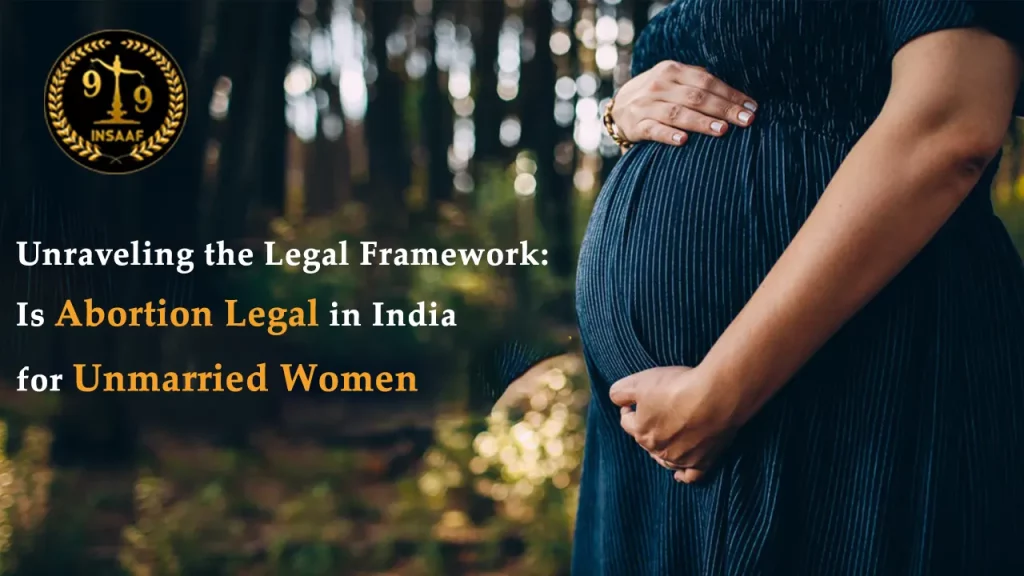

Online Legal Advice from Insaaf99® Online Lawyer Consultation in India


Online Legal Advice from Insaaf99® Online Lawyer Consultation in India

Navigating the intricate legal landscape of abortion in India poses a pertinent question: Is abortion legal for unmarried women? In a nation characterized by diverse social dynamics and recent amendments to the Medical Termination of Pregnancy (MTP) Act, enacted in 1971, this article aims to unravel the complexities surrounding abortion laws, particularly as they apply to unmarried women.
In India, the legality of abortion is firmly established by the Medical Termination of Pregnancy (MTP) Act, a comprehensive legal framework that underwent significant amendments in 2021. This article explores the legal landscape of abortion in India, with a specific focus on the rights of unmarried women.
The MTP Act stands as a beacon of gender equality, making no distinction between married and unmarried women. Both categories enjoy equal access to legal abortion services, highlighting the law's commitment to recognizing a woman's right to make decisions about her reproductive health, independent of marital status.
To determine the legality of abortion in India, the MTP Act outlines specific conditions:
Up to 20 Weeks: Abortion is legally permissible up to 20 weeks of gestation. Beyond this period, termination is allowed if it poses a threat to the woman's life or if there is a risk of physical or mental abnormalities in the child.
Medical Opinion: Legal abortion must be performed by a registered medical practitioner in a recognized medical facility. The medical practitioner's opinion is pivotal in determining the legality of the abortion under the Act.
Consent: The Act emphasizes the importance of a woman's consent. Abortion can be sought if the woman believes that the continuation of the pregnancy would endanger her physical or mental health or if there is a substantial risk of physical or mental abnormalities in the child.
Special Cases: Abortion is legally permitted in cases where pregnancy results from rape, the failure of contraception in a married woman, or if the child is likely to be born with physical or mental abnormalities.

Social Stigma and Pressure: Despite legal protections, unmarried women often grapple with societal stigma and familial pressure when opting for abortion. This societal disapproval can lead to feelings of shame and anxiety, creating emotional barriers to seeking necessary healthcare services.
Limited Access to Healthcare: Access to quality healthcare facilities and skilled medical professionals remains a challenge, particularly in rural areas. Unmarried women may face barriers in finding appropriate healthcare services, thereby impeding their ability to access safe and legal abortion procedures.
Misinterpretation of the MTP Act: The misinterpretation of the MTP Act by some healthcare providers is an additional hurdle. Personal biases and misconceptions about the legal framework may create unnecessary obstacles and delays for unmarried women seeking abortion services.
Legal Uncertainties: Ongoing legal discussions and the potential for amendments to the MTP Act contribute to uncertainties surrounding access to abortion for unmarried women. Concerns about future changes in legislation add an extra layer of complexity to an already challenging landscape.
Navigating these challenges requires a comprehensive approach, including awareness campaigns, improved healthcare infrastructure, and continuous efforts to address societal norms that contribute to the stigma surrounding unmarried women seeking abortion.
Despite the obstacles, there are encouraging developments. Government-operated hospitals and family planning clinics extend abortion services as per the MTP Act, serving as a pivotal safety net for unmarried women. Moreover, the active involvement of NGOs and women's rights organizations proves instrumental in fostering awareness, delivering counseling and legal assistance, and championing enhanced healthcare access. Resources such as helplines and online platforms furnish confidential information and support, empowering women to make informed decisions regarding their reproductive health.
In conclusion, the answer to the question "Is abortion legal in India for unmarried women?" is an affirmative yes. The MTP Act, fortified by recent amendments, ensures that the legal right to abortion is extended to all women, regardless of their marital status. The evolving legal landscape emphasizes the commitment to women's reproductive rights and the significance of safe and legal abortion services for every woman in India. Efforts to enhance awareness and foster a supportive societal environment remain crucial for empowering women to make informed choices about their reproductive health.
Insaaf99, an online legal consultation platform, plays a crucial role in situations involving abortion in India. This innovative platform connects individuals, including unmarried women seeking guidance on the legal aspects of abortion, with experienced legal professionals. Insaaf99 facilitates confidential and accessible consultations, providing a virtual space for users to discuss their concerns and queries related to abortion laws.
By offering expert advice and guidance, Insaaf99 empowers individuals to navigate the legal landscape with clarity and confidence. This online platform not only ensures privacy but also contributes to breaking down barriers, making legal information and assistance readily available to those in need, fostering a more informed and empowered society.